- Home
- Rachel Caine
Killman Creek (Stillhouse Lake Series Book 2) Page 9
Killman Creek (Stillhouse Lake Series Book 2) Read online
Page 9
My voice comes out a little shaky when I say, “What do you think was in the room—”
“Don’t go there,” Sam says, putting an arm around me. It’s unexpected, and welcome. We both reek of foul-smelling smoke, but I don’t mind. “We can’t know what he was hiding down there, and he damn sure wasn’t about to let us find out.”
“What if it was someone—”
“No,” he says. “You’ll rip your guts out if you do that. Don’t.”
I sense he doesn’t want to imagine it. I do, because I must: a young woman, maybe the age of Melvin’s chosen victims. Locked up, tied up maybe. Left to burn if anyone comes close to finding her.
“Maybe it was him,” I say. “Maybe he was down there, and he opened the door.”
“That’s a happier thought,” Sam agrees, but he shakes his head. “I was looking at the door when it opened. The knob didn’t turn. There was nobody on the other side. It was like a . . . remote-control release.”
“You mean we tripped some kind of sensor?”
“Maybe. But . . . maybe someone was watching us. Waiting for us to take the bait. And when we didn’t . . .”
That was right; I felt it click together inside. I’d had an overwhelming sense of being watched on those stairs. And I’d been right. Someone had been behind a camera. Probably had watched us going through the whole house. It was only after we’d found the hidden basement room that he’d taken action, though. “He was watching,” I agree. “And he was off-site. He had a remote control to open that door and set off the explosion. He must have been close by.”
“Not necessarily. He could have all of it routed through an app.” He gives me a fleeting trace of a smile. “The way you set up the cameras on your house.”
He’s right. I’d used Internet-capable cameras to monitor my house at Stillhouse Lake, and I could access and watch remotely from anywhere. The tools were common, and commercially available. “And the door?”
“Some Wi-Fi security apps let you lock and unlock doors,” he says. “He was probably watching us from the moment we broke in. Once we’d found the secret stairs, he waited for us to go down and open the door. That was probably booby-trapped; maybe he has some kind of disarming signal for the bomb he sends before he goes in himself. When we didn’t take the bait—”
“He triggered it for us,” I finish. “So he could be anywhere. We’ve got nothing.”
“Not necessarily,” he says, nodding to the packs we’ve got dumped in the floorboards between our feet. They’re stuffed with papers. It’s something. I hope. “Gwen, remember—”
Whatever he’s about to tell me, he’s interrupted by Lustig, who yanks the door open and says, “Okay, here’s what’s about to happen. All hell is going to break loose and rain down shit on us. County sheriffs, fire, ambulance. I’m going to claim federal jurisdiction. You two get taken to the hospital, but you do not move until I get there. And you do not answer questions until I get there. Understood?”
“Mike,” Sam says. “What the hell did we get into?”
The look Mike Lustig gives him is a two-parter: one says, Not here, and then flicks to me to indicate I’m not someone he wants to be letting in on the story. And why would he? Mike knows who I am. Who my ex-husband is. He probably doesn’t trust me any farther than he can throw a Sherman tank. That’s fair. I don’t trust him at all, and the fact that he’s got a badge and a gun and these doors don’t open from the inside makes me itch all over. He’s Sam’s friend, sure. But he isn’t mine. My trust isn’t contagious.
Lustig shuts the door again, cutting off a cold blast of wind that carries an edge of ice with it, and leans against the SUV as the first responder—a black-and-white county-sheriff SUV—rounds the curve and pulls to a stop beside us. No sirens, but the pulsing flare of the lights turns everything raw and cold in bursts, renders everything alien, even Sam’s face. I try the door. It doesn’t open. My heart thumps faster, and I look around for something, anything, I can use. Reflex. I can slither over the seat to the front and get out that way, I reassure myself. There might even be an extra gun in the glove compartment. If not, I can be out and running in seconds, and in these woods, in the dark, they’d have a hell of a time tracking me down.
It’s an academic exercise, this escape plan. I do it for every situation when I feel the least bit out of control. It helps. I’ve practiced the art of evade, attack, escape for years now in my head, and I’ve trained for it. My life—and the lives of my kids—depends on it.
“So what’s our story?” I ask Sam. “Because the truth isn’t going to fly. Not for this.”
“Stick as close to it as we can,” he says. “We came looking for answers. Found the door wide open. Went in to see if someone was hurt, discovered the secret room, got the hell out just in time.”
It doesn’t paint us as innocent, but it doesn’t indicate we brought dynamite and blew the place to smithereens, either, which I’m completely behind. I nod. Door is wide open. I visualize it in my mind, imagining our cautious approach, calling out, looking for someone who’s hurt. I imagine it until it seems so real it could be true, and then I keep on imagining it until it is true, and the other thing is a distant possibility. It’s the only way to consistently, convincingly lie: you have to believe it.
So I make myself believe it. Of course, if the door doesn’t burn completely, and they can determine it was locked, then we’re screwed. But given the inferno, I think we’re safe on that score.
More vehicles crowd around us, penning us in: two fire trucks, a single ambulance, another official-looking SUV, maybe from the forest service. The firefighters are carrying loads of hose into the woods up toward the blaze, and I hear the buzz overhead of a light aircraft; they’re spotting for spread of the fire.
It takes the better part of an hour before the glow of the fire is completely out, and then the night is lit only by the still-burning strobes of the emergency vehicles and flaring headlights. All the different sources paint everything a semiconsistent purple, with pops of blues and reds out of sequence. I keep my eyes closed after a while, and so I’m surprised when the door beside me is yanked open. I straighten up fast and realize I’m looking at a young, slender African American man in an ill-fitting paramedic’s uniform. “Ma’am,” he says, and his Georgia accent is already in full force. “I need to check you over. Can you walk for me over to the ambulance?”
“Sure,” I tell him, getting out of the SUV with a little burst of relief. No escape required, after all. At least, not yet. Another paramedic is guiding Sam, and we end up perched together on the step of the ambulance as we’re checked out. Sam is diagnosed with a mild concussion and cracked ribs; he’s tagged for transport to the hospital. My headache earns me the same privilege, but no way do I want to leave our bags behind in Mike Lustig’s SUV, or rob us of getaway transportation. I decline. While they put Sam in the ambulance, I move our stuff back to our own rented vehicle, which is thankfully pulled far enough off to the side that I can back it around the blockage.
I’m halfway out when Mike Lustig steps into my path, and I have to brake hard to avoid giving him a bumper kiss; once I’m stopped, he steps around to my driver’s side door and taps on the window. I roll it down. “I’m heading for the hospital,” I tell him. “And I’ll wait there.”
“Fine,” he tells me. “You two need to be right about this. You ready?” His gaze tells me I’d better be. I nod. “Don’t leave the hospital. I’ll be there soon as I can.”
I nod, and then I back up and turn to follow the ambulance down the winding mountain road, away from the ashes of what we’d hoped to discover.
The first thing I do, once the doctors have checked me, is sit down and call Javier, even though it’s now nearly five in the morning. I don’t tell him about the fire, or the near miss. I just tell him we’re okay. He can tell we’re at a hospital, though thankfully he doesn’t ask many questions, and I don’t have to lie.
“How are they?” I ask him. I’ve woken
Javier up, and I feel bad about it, but hearing his voice is an immense relief. “Are they adjusting?”
“I don’t know yet,” he says, which is honest. He’s keeping his voice down, and I hear the rustle of clothes and footsteps. I imagine him putting on a coat and stepping out onto his porch, because I hear the slight hiss of wind over the phone speaker, and the creak of wood as he sits down on the chair he keeps there. “Jesus, it’s freezing tonight. The kids are fine, but I can’t say they’re happy. It’s setting in on them that you’re in danger. Lanny’s dying to get out of the house. Connor just . . . reads. Is that normal?”
“More or less,” I say. “Tell them I love them, will you?”
“Sure.” He hesitates for a few seconds, and then he yawns. It’s contagious, and I do, too, and realize how exhausted I am, again. “You’re not okay, Gwen. I can tell.”
“I’m okay enough.”
“You coming back soon?”
“I don’t know,” I tell him softly. “I’m trying.”
When I hang up, I find my chest is tight, my throat sore with unshed tears.
Eight long ER hours later, Sam’s injuries have been confirmed as cracked ribs and a minor concussion. I’ve been warned my head will hurt like a son of a bitch for about a day (and it already does, despite a generous application of over-the-counter painkillers). By the time Sam’s ribs have been wrapped and we’ve been relieved of payments we can’t afford, we find three beefy white men in uniform waiting for us in the hallway. They’re virtually identical, all with the blocky build of guys whose glory days came as high school linebackers; they’ve all got buzz cuts and tans that end at their collars and cuffs. Mike Lustig, in his FBI body armor and badge and blackness, stands apart, leaning against the wall with his arms folded. In the better light here, he has a long, friendly sort of face, one that seems prone to breaking into ironic smiles more than angry frowns.
Can’t say the same for the Georgia bulldogs. They all look impassive at best, outright antagonistic at worst.
“Mr. Cade? Mrs. Royal?”
“It’s Ms.,” I automatically correct, and then I take in that he’s called me by my old name. “Not Royal. My name is Gwen Proctor.”
“My info says Gina Royal,” the spokesman says, with a grim little twist of his lips that I don’t mistake for a smile. “You come with me, Miz.”
I glance at Mike Lustig. He shrugs. “I got no dog in this fight,” he says. “Go on.”
Sam and I exchange a quick look, and I nod to let him know it’s fine. I don’t know if it’s fine, but there’s no point, and no benefit, to staging a war here in the hallway. I walk with the officer around the corner to a quiet waiting room, and he gestures me to a corner seat. It’s the farthest one from the exit, but I automatically calculate the ways out, just for practice. Agent Lustig hasn’t followed us.
Interestingly, the officer excuses himself almost immediately and shuts the door. I check my watch and start counting. I expect he’ll let me cool my heels for at least an hour. It’s standard technique. The more off balance and tired a subject is, the better the chances of a slipup.
Georgia’s playbook clearly says two hours are the optimum, because it’s nearly three when the officer returns. He squeezes himself into the chair next to me, too close for comfort. I imagine he means to intimidate. It just annoys me. If he really knows who I am, then surely he understands I have a whole different scale of intimidation. He smells like sweat and smoke, which means he was up at the cabin, or what’s left of it. There’s a small stained area on his left sleeve that looks like old blood, and now that I’ve seen it, I can’t quite look away. Did he get it helping someone? Or punching someone? Though sometimes, you have to punch one person to help another.
“So,” I say to him, “Officer—”
“Turner, ma’am.”
“Officer Turner, was calling me by a dead name a power play, or just a mistake?”
He leans back with a creak of plastic, and he considers me with the expressionless eyes of someone who’s been in law enforcement for years. He’s considering which approach to take: bully, or country-boy charm. Neither will work, but it’s a little interesting to watch his internal debate.
He decides to go with country-boy charm, and when he speaks again, his voice is warmer, with a touch more drawl, and he’s even managed a bashful smile. “I admit, ma’am, I thought that might throw you off balance. I apologize if I upset you. Mind if we start over?”
“Sure,” I tell him, with a smile every bit as false. “What can I do for you, Officer Turner?”
“I just need you to start from the beginning and tell me how you came to be up there around that cabin, ma’am. How you got the idea to go up there, what happened, that sort of thing.”
I sigh. “I don’t suppose I could coax a cup of coffee out of you for it, could I?”
He falls for it, though only to the extent of going to the hallway, motioning to someone, and presumably ordering up my caffeine. He’s all smiles when he comes back. I summon up one in answer, though I’m not feeling it. “Now,” he says, settling in again, “you were saying?”
I toy with just answering I wasn’t, and asking for a lawyer; I’m still not sure I don’t really need one. The evidence can read a lot of ways, and neither Sam nor I planned on having to answer these questions. So I say, “Mind if I ask one question first?”
He considers, then nods. “Go ahead.”
“Did you find any bodies in there?”
More considering, and then a slow shake of his head. “Can’t rightly say. So what exactly brought you up to that cabin, Ms. Proctor?” He’s allowed to lie to me, of course. It’s a time-honored tradition in interrogations, although I haven’t yet been advised of my rights. Which is telling.
I stick to my story, the first part of which is true: that we were hoping to discover some information about someone who was helping my ex-husband evade capture. That gets an eyebrow raise, but no comment. It’s exactly what Sam’s going to say. We’ve already determined that truth is our best defense, up to a point . . . any other explanation is going to invite suspicion, with my obviously sinister ex in the background. I tell him about the open door and how we cautiously ventured inside. Just as I rehearsed it.
“And what did you find?”
“Nothing,” I lie, easy as breathing. I’m not giving up what we brought out of there. “We didn’t have time.”
“You just . . . went on in?”
“The door was open,” I say blandly. “We thought he might have been hurt or in trouble.”
“Never crossed your mind a guy like that might shoot you dead for walking in on him?”
I shrug. Don’t answer. Stupidity isn’t a crime. He has nothing to coax out of that, except the fact that both Sam and I were armed, of course. But legally. Trespassing is a thin charge, at best. He won’t bother, unless he thinks he can pin something bigger on top of it.
Officer Turner alters his body language into let’s-be-frank. For him, it involves leaning forward, resting his elbows on his thighs, and tenting his big hands together. “Ms. Proctor,” he says, “right now, local officers in Tennessee are going through your house up there at Stillhouse Lake, looking for anything that links you to your ex-husband. Your phone records are being analyzed. We know you went to see him before he broke out. You got something you want to get off your chest now, before those results come to light? Might do you some good.”
Amateur. I went through years of this, from interrogators far better—and worse—than he is. I gaze at him thoughtfully for a moment, and then I say, “I hate Melvin Royal. He’s hunting me, Officer Turner. Do you know how that feels? Do you really think I want to help him? Because if you stand me in front of him and give me a gun, I will not hesitate to put a goddamn bullet in that man’s head.”
I mean every word of it, with an intensity that takes even my own breath away.
Turner slowly leans back, hands smoothing flat against his thighs. He’s got those lightless, me
rciless eyes that all cops seem to share, the ones that are constantly taking in everything and giving back nothing. For all his awkwardly folksy manner, he’s a shark.
There’s a knock at the door, and Turner gets up to retrieve two flimsy cups. He hands one to me, and I gratefully wrap cold hands around it. The coffee is a crime in itself, but at least it’s warm, and it cuts the astringent hospital smell. This place stinks of fear and despair and boredom, of unwashed people whose body odor has soaked into the couches. There’s a tiny, sad little play area in the corner for kids. It’s currently deserted, but I think of Lanny and Connor, only ten and seven when a car smashed into Melvin’s garage and revealed his horrors to the world. In my gut, they’ll always be that age. That vulnerable, shattered age.
“You want to tell me what was in that basement?” I ask Turner, cutting my eyes suddenly to him. It startles him a little. “Because our guy didn’t want anybody to see it. Whatever it was.”
“It’s pretty well destroyed,” he tells me. “Ain’t nobody going to get down there to take a good look for a while. Going to be hours before it’s safe. We might still find bodies.”
I hope not, too. Desperately. I nod, then drink the rest of my coffee in a thirsty rush. “Right. Well, I’m going to go now. Thanks for the coffee.” He stands up with me, blocking my way. I stare at him and slowly allow the corners of my lips to curl, just a little. “Unless you’d like to arrest me . . . ?”
He’s got nothing concrete, and he knows that. He’s bluffing when he says, “Sit down, Ms. Proctor. We’ve got more to talk about.”
I don’t answer. I just walk toward him. At the last moment, he moves. Illegal detention wouldn’t do him any favors, and he’s smart enough to know I can’t be buffaloed into thinking he’s got cause. Yes, there’s a burned-out cabin. Yes, I was inside. But there’s ample evidence that the place had been booby-trapped, and I was lucky to escape alive, and they’ve got lots of tantalizing evidence to analyze that doesn’t have anything to do with me and my maybe-but-not-provable illegal entry.

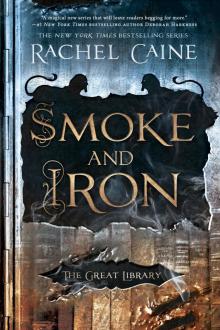 Smoke and Iron
Smoke and Iron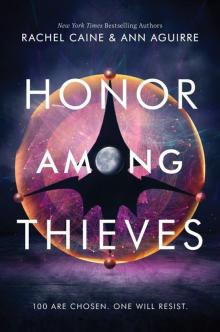 Honor Among Thieves
Honor Among Thieves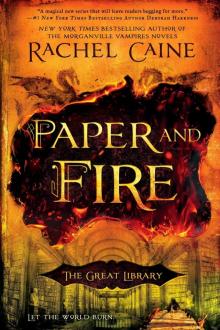 Paper and Fire
Paper and Fire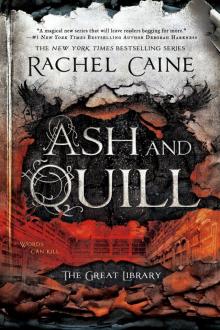 Ash and Quill
Ash and Quill Wolfhunter River (Stillhouse Lake Book 3)
Wolfhunter River (Stillhouse Lake Book 3) Undone
Undone Glass Houses
Glass Houses Prince of Shadows
Prince of Shadows Unseen
Unseen Midnight at Mart's
Midnight at Mart's The Dead Girls Dance
The Dead Girls Dance Last Breath
Last Breath Stillhouse Lake
Stillhouse Lake Daylighters
Daylighters Midnight Alley
Midnight Alley Black Dawn
Black Dawn Fall of Night
Fall of Night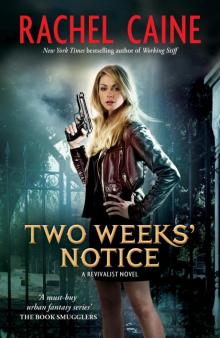 Two Weeks Notice
Two Weeks Notice Bitter Blood
Bitter Blood Carpe Corpus
Carpe Corpus Kiss of Death
Kiss of Death Ghost Town
Ghost Town Ill Wind
Ill Wind Fade Out
Fade Out Total Eclipse
Total Eclipse Honor Lost
Honor Lost Thin Air
Thin Air Black Corner
Black Corner Firestorm
Firestorm Bite Club
Bite Club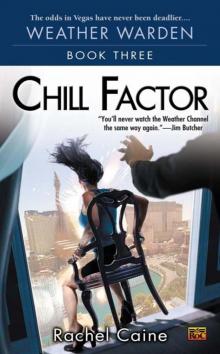 Chill Factor
Chill Factor Windfall
Windfall Oasis
Oasis Devils Bargain
Devils Bargain Terminated
Terminated Feast of Fools
Feast of Fools Lord of Misrule
Lord of Misrule Devils Due
Devils Due Ladies' Night
Ladies' Night Gale Force
Gale Force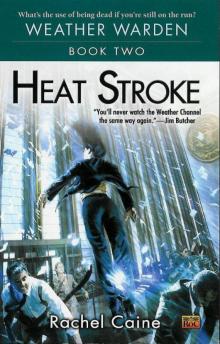 Heat Stroke
Heat Stroke Killman Creek
Killman Creek Sword and Pen
Sword and Pen Cape Storm
Cape Storm Unbroken
Unbroken Windfall tww-4
Windfall tww-4 Heartbreak Bay (Stillhouse Lake)
Heartbreak Bay (Stillhouse Lake) Daylighters: The Morganville Vampires
Daylighters: The Morganville Vampires Duty
Duty Honor Bound
Honor Bound Unseen os-3
Unseen os-3 Firestorm tww-5
Firestorm tww-5 Blue Crush
Blue Crush Devil s Bargain
Devil s Bargain Prince of Shadows: A Novel of Romeo and Juliet
Prince of Shadows: A Novel of Romeo and Juliet Bite Club mv-10
Bite Club mv-10 Terminated tr-3
Terminated tr-3 The Morganville Vampires 14 - Fall of Night
The Morganville Vampires 14 - Fall of Night Bitter Blood tmv-13
Bitter Blood tmv-13 Falling for Grace
Falling for Grace The True Blood of Martyrs
The True Blood of Martyrs Fall of Night (The Morganville Vampires)
Fall of Night (The Morganville Vampires) Devil's Bargain rld-1
Devil's Bargain rld-1 The Morganville Vampires (Books 1-8)
The Morganville Vampires (Books 1-8)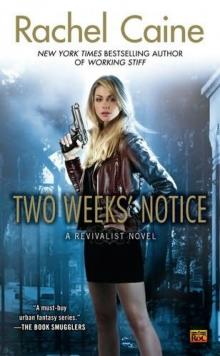 Two Weeks' Notice tr-2
Two Weeks' Notice tr-2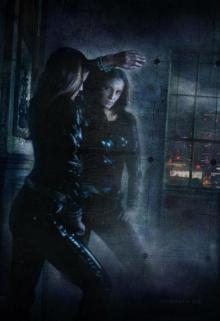 An Affinity for Blue
An Affinity for Blue Caine, Rachel-Short Stories
Caine, Rachel-Short Stories Kiss of Death tmv-8
Kiss of Death tmv-8 WITCHGRAVE
WITCHGRAVE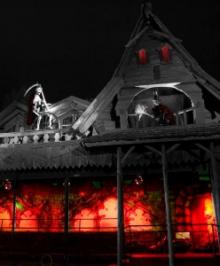 Dark Rides
Dark Rides The Morganville Vampires
The Morganville Vampires Killman Creek (Stillhouse Lake Series Book 2)
Killman Creek (Stillhouse Lake Series Book 2) Midnight Bites
Midnight Bites Line of Sight
Line of Sight![Morganville Vampires [01] Glass Houses Read online](http://i1.bookreadfree.com/i1/03/30/morganville_vampires_01_glass_houses_preview.jpg) Morganville Vampires [01] Glass Houses
Morganville Vampires [01] Glass Houses Black Dawn tmv-12
Black Dawn tmv-12 Midnight at Mart ww-103
Midnight at Mart ww-103 Feast of Fools tmv-4
Feast of Fools tmv-4 Ill Wind tww-1
Ill Wind tww-1 Devil's Due rld-2
Devil's Due rld-2 Black Dawn: The Morganville Vampires
Black Dawn: The Morganville Vampires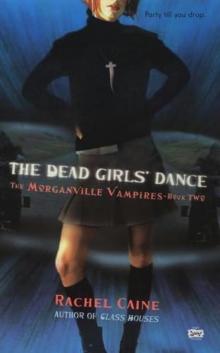 Dead Girls' Dance tmv-2
Dead Girls' Dance tmv-2 Minute Maids
Minute Maids Carpe Corpus tmv-6
Carpe Corpus tmv-6 Total Eclipse tww-9
Total Eclipse tww-9 Ghost Town mv-9
Ghost Town mv-9 Lord of Misrule tmv-5
Lord of Misrule tmv-5 Faith Like Wine
Faith Like Wine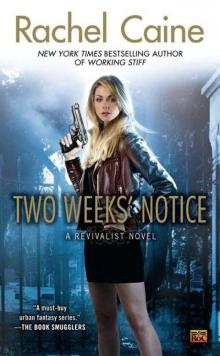 Two Weeks' Notice: A Revivalist Novel
Two Weeks' Notice: A Revivalist Novel Daylighters tmv-15
Daylighters tmv-15 Stamps, Vamps & Tramps (A Three Little Words Anthology)
Stamps, Vamps & Tramps (A Three Little Words Anthology) Unbroken os-4
Unbroken os-4 Unknown os-2
Unknown os-2 4 - Unbroken
4 - Unbroken Cape Storm tww-8
Cape Storm tww-8 Last Breath tmv-11
Last Breath tmv-11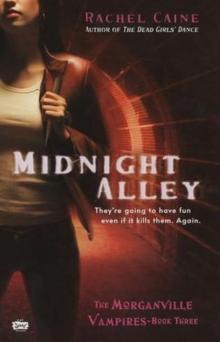 Midnight Alley tmv-3
Midnight Alley tmv-3 Glass Houses tmv-1
Glass Houses tmv-1 Fade Out tmv-7
Fade Out tmv-7 Fall of Night tmv-14
Fall of Night tmv-14 Godfellas
Godfellas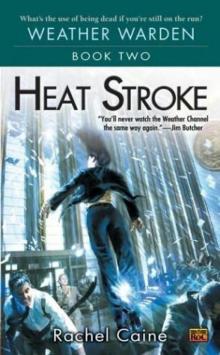 Heat Stroke ww-2
Heat Stroke ww-2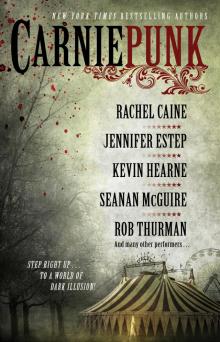 Carniepunk
Carniepunk Oasis ww-102
Oasis ww-102 Gale Force tww-7
Gale Force tww-7 Working Stiff tr-1
Working Stiff tr-1